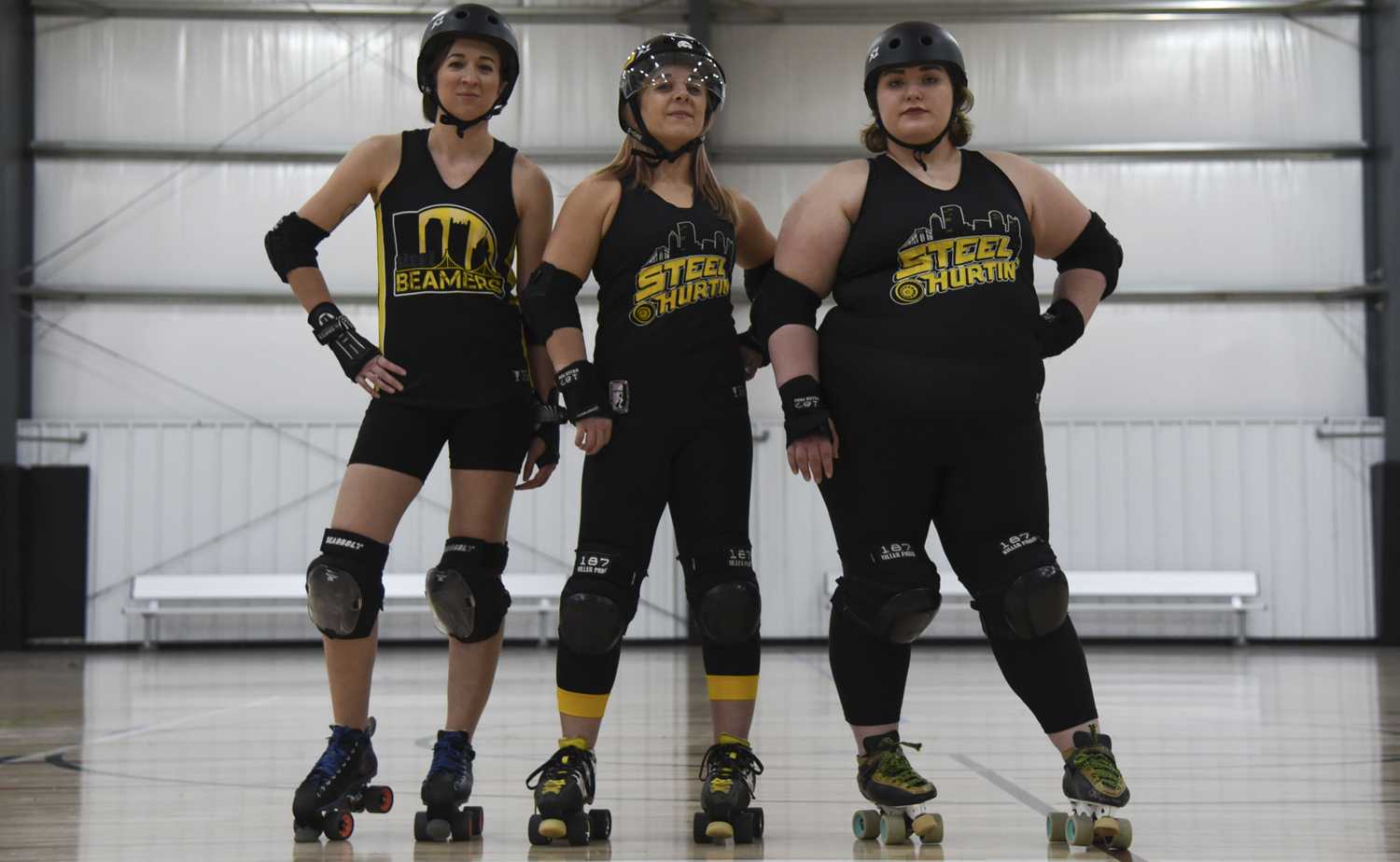On the flat track: new class of derby skaters trains


(From left) Alyssa Quintanilla, Jamie Fargo and Alivia Martin stand in the middle of the flat rink at the Pittsburgh Indoor Sports Arena, where they practice and hold games. (Photo by Anna Bongardino | Assistant Visual Editor)
While some people spend their free time reading, painting or curled up on the couch binge-watching Netflix, the ladies of Steel City Roller Derby spend their free time lacing up roller skates and slamming their bodies into each other.
Over the rubbery bark and chatter of skates, a new class of skaters practices in the Pittsburgh Indoor Sports Arena. More experienced skaters on the Steel City Roller Derby team call these new members “fresh meat.” The women work on basic skills every Monday night — like quick recovery after getting knocked down and how to gridlock an opposing team member.
Practice leader Shannon Apostolec — also known as Amy Roundhouse — stood in the middle of the arena. Her presence was amplified as she shouted guidance over the noise.
“If anyone at any time is super uncomfortable, please sit out and let us know,” she said. “It’s fine.”
Though many have only known each other a few weeks or months, the 32 members at practice chat like old buddies about strength training and parties in the South Side. Their words and whoops mingle with the heavy scent of sweat and the occasional whiff of burning rubber.
Most members have partially dyed or shaved heads and are covered with tattoos. Helmets and shirts are plastered with stickers about Pittsburgh and politics — a sticker with bolded text on one helmet reads, “Yinz skate like jagoffs,” and another says “IMPEACH” over a picture of Donald Trump.
On the rink, Alyssa Quintanilla, a 26-year-old second-year English Ph.D. student at Pitt, goes by Slam Houston and is an A-team competitor and head of league outreach.
Quintanilla doesn’t remember where she first heard about Roller Derby. She didn’t notice the scene as an undergrad at the University of North Texas — located in the state where roller derby saw a revitalization in the early 2000s. Instead, she dabbled in it while getting her master’s degree at the University of Colorado Boulder and embraced it when she moved to Pittsburgh in 2015.
“I moved here and just fell in love with Steel City [Roller Derby],” she said. “And made so many friends immediately — it’s been great.”
But because the team fell low in the rankings and lost numerous members, SCRD is training a new class of skaters during their first ever off-season. Their team structure has also changed from a variety of teams with names like “The Bitch Doctor” to a standardized A, B and C team system. The changes are welcome after a difficult season of losing A-team veteran skaters to retirement and relocation.
Jamie Fargo is one veteran skater that stayed this season. Fargo, also known as Ally McKill, joined when SRCD was founded in 2006. She doesn’t plan on retiring any time soon.
“People know [Roller Derby] exists, and they kinda know it’s a thing,” Fargo said. “But they don’t really have an idea of how widespread it is, how many people play, and what exactly it entails. So a lot of what I do is sort of educating people on it. I answer the questions: ‘What is this? How do you win?’”
They are not the simplest questions to answer. The 403 groups registered with the Women’s Flat Track Derby Association are international, spanning from Australia to Maui to Dublin. The contact sport has a history of being both athletic competition and theatrical event — with stage names and team themes.
The sport involves two teams of five lapping around a rink — also known as a flat track — in about a dozen short bursts, called jams. One member, called a jammer, from each team tries to pass the other team. The majority of the team acts as blockers, meaning they try to keep the opposing team’s jammer from passing.
It can get more complex than that, depending on the strategies of the teams and the heat of the game. And the changes the sport has seen in the last decade are even more complex. Fargo welcomes the changes — she enjoys how widespread derby has become and how seriously it is being taken.
“[In the beginning] it was very theatrical. Not fake — the action was 100 percent real, but it wasn’t so focused on it being so athletic,” Fargo said. “But then … if you weren’t cross-training outside of practice and like focusing on nutrition and focusing on getting strong, you weren’t going to see play time because it became a lot more competitive.”
Fargo said she knows firsthand the competitive trials of the sport. After being captain and co-captain of the A-team Steel Hurtin’ for years, the 39-year-old lawyer suffered a foot injury during a 2016 practice. She’s been on crutches and in and out of doctors’ offices since. Now she now acts as a league’s representative, but with plans to be back on the flat track within six weeks. She said she looks forward to getting back to playing.
“It’s such a mixed jumble of people from every single background you could possibly imagine and, you know, not necessarily people I’d meet in my day-to-day life,” Fargo said. “Maybe we would have never been friends had it not been for roller derby, because we would have never met.”
Since its beginning, derby has had political progressive undertones. WFTDA has an inclusive statement about gender on their site which states that nonbinary people, trans and intersex women are welcome to play.
“Gender doesn’t necessitate where you can play derby — just play derby,” Quintanilla said.
Derby’s inclusion is about welcoming a variety of body types in addition to gender nonconforming members.
“Every single body type has a place on the track. Roller Derby is for everyone. There is no body type that doesn’t belong,” Quintanilla said. “When you’re looking at someone really small, and they’re like ‘Oh, you’re hitting other people?’ you’re like ‘Yes, because I take up space and I know how to use my body in this way.’”
Other members agree. Alivia Martin, a 20-year-old communications sophomore at Pitt, credits who she is today to derby. She joined the Pittsburgh Derby Brats — a team composed of 10- to 17-year-olds — when she was 16, and moved up to SCRD when she was 18.
“It’s helped me build my confidence a lot. It’s helped me figure out who I am as a woman. It’s helped shape my political beliefs and moral beliefs,” Martin said. “[I’m] around a community of women that are all really strong and confident.”
For Martin, it also helped her choose her career goals. When she recently became head of skater relations at SCRD, it solidified her aspirations to go into human resources.
“I just want people to feel safe and have someone to go to to talk about issues,” she said. “And feel … that I have someone to go to when maybe they don’t feel like they can talk to anybody else.”
Both Martin and Quintanilla expressed how difficult it is to juggle derby and school. However, they wouldn’t have it any other way. After helping at the fresh meat practice that Monday, Quintanilla drove back to Oakland. She went into detail about her thesis — an in-depth analysis on language used to describe immigrants and the Mexican border. But she said the work is easy compared to roller derby.
“Every time I have to do a presentation or something I’m worried about, I’m like — I get hit by women on roller skates for fun,” Quintanilla said. “I can do anything.”
Recent Posts
SGB addresses concerns about ICE presence on campus, hears SJP lawsuit against administration, approves governing code bill
At its weekly meeting on Tuesday at Nordy’s Place, Student Government Board heard concerns about…
ACLU of Pennsylvania sues Pitt over SJP suspension
The ACLU of Pennsylvania filed a federal civil lawsuit against the University of Pittsburgh and…
Marquan Pope: The ultimate shark
One of the most remarkable things about sharks is that an injury doesn’t deter them.…
Who Asked? // Do we really get a summer vacation?
This installment of Who Asked? by staff writer Brynn Murawski mourns the seemingly impossible perfect…
Notes From an Average Girl // Notes from my junior year
In this edition of Notes From an Average Girl, senior staff writer Madeline Milchman reflects…
Meaning at the Movies // The Power of the Movie Theater
In this edition of “Meaning at the Movies,” staff writer Lauren Deaton discusses her love…

